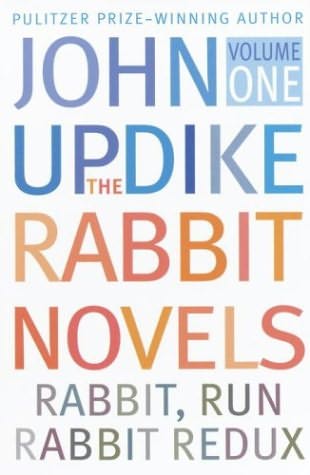 I knew Fringe had to run a tribute to Updike when I broke the news to the editors and received this email in response:
I knew Fringe had to run a tribute to Updike when I broke the news to the editors and received this email in response:“Damn! No more girl-at-the-supermarket-has-nice-legs i'm-a-bastard-but-i-said-so-so-i'm-immune-from-criticism stories! Wait . . . . that's probably not true at all.”
Someone whose death could inspire such a sarcastic email surely deserved a deeper investigation, possibly from people who actually revered and were troubled by Updike (or Updick, as one ladies' book club dubbed him many years ago).
Sure, we’ve run a project trying to speed the demise of the all-white all-male canon , and personally, I’ve spent a fair amount of time being angry at the canon, and by extension Updike, Melville and Cormac McCarthy, but while I'm feeling generous toward the dead, I'll say that it wasn’t Updike’s fault that people liked him, and his prolific output alone makes him worth emulating and eulogizing.
I was surprised that when I heard the news about Updike, I felt a little sad. I only read his work when my MFA workshops forced me to. During our discussion of “Pigeon Feathers” I’m sure I used phrases like “hetero-patriarchal order,” which is one of my favorites to say aloud because it has so many syllables.
But Updike had his finger on the pulse of a certain kind of life. Certain passages in “Pigeon Feathers” are stunning, and even if they’re tapping into the white hetero-patriarchal zeitgeist that our culture thrusts upon us, at least they tap into something real.
For some time now, my anger at the canon has been receding and the likelihood that I’ll read a Rabbit novel has been rising. As one of my mentors might say, I’m lucky to have Updike to look forward to. And I’ll get right on it once I’m done with The Brief Wondrous Life of Oscar Wao. And The Age of Innocence. And Middlesex. And writing my book.
John Updike, American man of letters, we’ll miss you.
I was surprised that when I heard the news about Updike, I felt a little sad. I only read his work when my MFA workshops forced me to. During our discussion of “Pigeon Feathers” I’m sure I used phrases like “hetero-patriarchal order,” which is one of my favorites to say aloud because it has so many syllables.
But Updike had his finger on the pulse of a certain kind of life. Certain passages in “Pigeon Feathers” are stunning, and even if they’re tapping into the white hetero-patriarchal zeitgeist that our culture thrusts upon us, at least they tap into something real.
For some time now, my anger at the canon has been receding and the likelihood that I’ll read a Rabbit novel has been rising. As one of my mentors might say, I’m lucky to have Updike to look forward to. And I’ll get right on it once I’m done with The Brief Wondrous Life of Oscar Wao. And The Age of Innocence. And Middlesex. And writing my book.
John Updike, American man of letters, we’ll miss you.
Cross posted at LizzieStark.com










